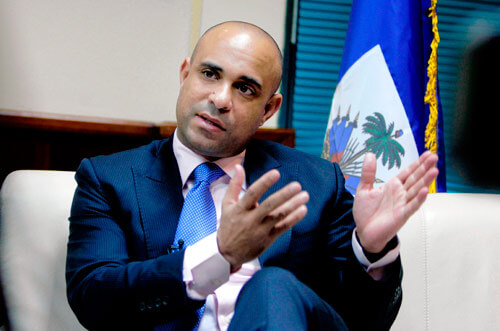Haiti President President Michel Martelly on March 1 nominated his Foreign Minister Laurent Lamothe, as the next prime minister in the earthquake-ravaged, French-speaking Caribbean country.
Senate President Simon Desras said Lamonthe, 39, one of Martelly’s closest advisors and longtime friend, was named in an official letter to lawmakers.
Martelly and Lamonthe were partners in Global Voice Group, a South Africa-based telecom company, which among other things, offer prepaid calling cards, before Martelly’s candidacy for president. Lamothe represented Haiti on the country’s Davis Cup team in the mid-1990s.
Haitian legislators have already begun discussing whether Lamothe meets the basic constitutional requirements to replace caretaker Prime Minister Garry Camille, who resigned a week before after four months on the job.
Among the issues being raised among senators are Lamothe’s residency, nationality and the need for him to present a “discharge,” a document clearing him of any mismanagement of state funds in the four months he has been foreign minister.
Haiti’s constitution not only forbids the prime minister from holding a foreign passport, but the individual is required to have lived in the country for the past five years.
Before his foray into Haitian politics, the U.S.-educated Lamothe was a businessman living in Miami and parts of Africa, where his company did extensive business.
Lamothe was born in Port-au-Prince, but like others in the Martelly administration, has been the subject of dual nationality accusations by some lawmakers. He has denied renouncing his Haitian citizenship.
After Martelly, Lamothe’s has been the most visible face of the Haitian government. He has used his position as foreign minister to promote foreign investment, and he serves as co-chairman of the Presidential Advisory Council for the Economic Development and Investment in Haiti along with former President Bill Clinton.
“I am not sure why Lamothe wants to be prime minister. He is in a position of power. He was even more powerful than Conille,” Michel Eric Gaillard, a Port-au-Prince political analyst, referring to Lamothe’s closeness to Martelly and reputation as the “go-to” guy even among some foreign diplomats seeking to influence Martelly, told reporters.
“For Lamothe to win the nomination, President Martelly will need to improve on his negotiating skills with the parliament,’’ he added.
Lamothe’s nomination comes less than a week after Conille’s surprised resignation. He stepped down amid tensions with Martelly and members of his cabinet. Conille is the 10th prime minister to be deposed or dismissed, or who has resigned, since Haiti ushered in democracy in 1986.
In a statement after Conille’s resignation, Clinton, who co-chaired the Interim Haiti Recovery Commission, said he had “tremendous respect for Prime Minister Conille and his decision to step down.” Conille had served as a top Clinton aide in his role as U.N. Special Envoy for Haiti and co-chairman of the recovery commission.
Clinton urged Martelly, his government and Parliament to quickly confirm a new prime minister, hold parliamentary and local elections, “and to return to putting the people and future of Haiti ahead of political and personal gain.”

























